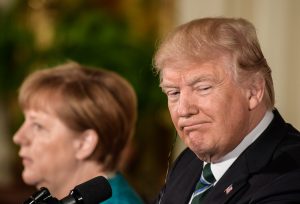
Washington, Mar 17 (EFE).- US President Donald Trump and German Chancellor Angela Merkel acknowledged past differences here Friday in a chilly first encounter between two leaders with widely diverging views of the world.
The face-to-face talks at the White House seemed to do little to narrow the breach exposed by Trump’s criticism of Merkel during the 2016 presidential campaign.
What may have been the most telling episode of the visit took place during a photo opportunity in the Oval Office.
In response to calls from the press, Merkel asked Trump if he wanted to shake hands for the cameras, but the president did not respond.
Trump, known for his enthusiastic greetings, did extend his hand to Merkel when she arrived at the White House.
“I’ve always said it’s much, much better to talk to one another and not about one another, and I think our conversation proved this,” Merkel said through a translator during a joint press conference with her host, who in the past accused her of “ruining” Germany by admitting large numbers of Middle Eastern refugees.
The president, meanwhile, praised the chancellor for Germany’s efforts in Afghanistan and its contributions to the fight against Islamic State.
At the same time, he again raised the complaint that many European members of NATO – which he has described as “obsolete” – were not pulling their weight within the Atlantic Alliance.
“I reiterated to Chancellor Merkel my strong support for NATO as well as the need for our NATO allies to pay their fair share for the cost of defense,” Trump said.
“Many nations owe vast sums of money from past years and it is very unfair to the United States. These nations must pay what they owe,” he said, apparently referring to the failure of some member-states to comply with the NATO guideline calling for devoting at least 2 percent of gross domestic product to the military.
Trump expressed appreciation for Merkel’s assurance that Germany is committed to increasing its military spending.
More differences were evident on the subject of immigration.
“Immigration is a privilege, not a right, and the safety of our citizens must always come first, without question,” Trump said in the wake of court rulings blocking his second attempt to temporarily ban refugees as well as travelers from six Muslim-majority nations.
The German leader, who has criticized Trump’s travel ban, said that efforts to make borders secure and integrate immigrants must include “looking at the refugees as well, giving them opportunities to shape their own lives.”
The West, she said, should “help countries who right now are not able to do so, sometimes because they have civil war.”
On economic matters, the chancellor said she hoped Trump would consider re-opening discussions on the Transatlantic Trade and Investment Partnership, a proposed pact between the US and the European Union.
One of Trump’s first actions as president was to formally withdraw the US from the 12-nation Trans-Pacific Partnership and he made no secret of his dislike for multilateral deals.
Merkel said she was in agreement with Trump that “trade has to be fairer, has to be a win-win situation.”
“Globalization ought to be shaped in an open-minded way, but also in a fair way,” she said.
“I am a trader, I am a fair trader, a trader that wants to see good for everybody worldwide, but I’m not an isolationist by any stretch of the imagination,” Trump said, clearly annoyed at a German reporter for posing a question to Merkel about the president’s “isolationism.”
Germany, one of the world’s biggest exporters, currently enjoys a trade surplus with the US.
“I would say that the negotiators for Germany have done a far better job than the United States but hopefully we can even it out,” Trump said.
The press conference ended on an unusual note, as a German reporter asked Trump about the controversy created when the White House cited a media report claiming that a UK intelligence agency spied on him during the 2016 campaign at the request of then-President Barack Obama.
“As far as wiretapping, I guess, by this past administration, at least we have something in common, perhaps,” Trump said, looking over at Merkel, who reacted with anger in 2013 when documents provided by Edward Snowden revealed that the US had monitored her communications.
“We said nothing,” the president said. “All we did was quote a certain very talented legal mind who was the one responsible for saying that on television. I didn’t make an opinion on it.”
“You shouldn’t be talking to me. You should be talking to Fox,” Trump said, though he did stand by his assertion that Obama spied on him.
